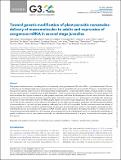Toward genetic modification of plant-parasitic nematodes : delivery of macromolecules to adults and expression of exogenous mRNA in second stage juveniles
Abstract
Plant-parasitic nematodes are a continuing threat to food security, causing an estimated 100 billion USD in crop losses each year. The most problematic are the obligate sedentary endoparasites (primarily root knot nematodes and cyst nematodes). Progress in understanding their biology is held back by a lack of tools for functional genetics: forward genetics is largely restricted to studies of natural variation in populations and reverse genetics is entirely reliant on RNA interference. There is an expectation that the development of functional genetic tools would accelerate the progress of research on plant-parasitic nematodes, and hence the development of novel control solutions. Here, we develop some of the foundational biology required to deliver a functional genetic tool kit in plant-parasitic nematodes. We characterize the gonads of male Heterodera schachtii and Meloidogyne hapla in the context of spermatogenesis. We test and optimize various methods for the delivery, expression, and/or detection of exogenous nucleic acids in plant-parasitic nematodes. We demonstrate that delivery of macromolecules to cyst and root knot nematode male germlines is difficult, but possible. Similarly, we demonstrate the delivery of oligonucleotides to root knot nematode gametes. Finally, we develop a transient expression system in plant-parasitic nematodes by demonstrating the delivery and expression of exogenous mRNA encoding various reporter genes throughout the body of H. schachtii juveniles using lipofectamine-based transfection. We anticipate these developments to be independently useful, will expedite the development of genetic modification tools for plant-parasitic nematodes, and ultimately catalyze research on a group of nematodes that threaten global food security.
Citation
Kranse , O , Beasley , H , Adams , S , Pires-daSilva , A , Bell , C , Lilley , C J , Urwin , P E , Bird , D , Miska , E , Smant , G , Gheysen , G , Jones , J , Viney , M , Abad , P , Maier , T R , Baum , T J , Siddique , S , Williamson , V , Akay , A & Eves-van den Akker , S 2021 , ' Toward genetic modification of plant-parasitic nematodes : delivery of macromolecules to adults and expression of exogenous mRNA in second stage juveniles ' , G3: Genes, Genomes, Genetics , vol. 11 , no. 2 , jkaa058 . https://doi.org/10.1093/g3journal/jkaa058
Publication
G3: Genes, Genomes, Genetics
Status
Peer reviewed
ISSN
2160-1836Type
Journal article
Description
Funding: Work on plant-parasitic nematodes at the University of Cambridge is supported by DEFRA licence 125034/359149/3, and was funded by Biotechnology and Biological Sciences Research Council (BBSRC) grants BB/R011311/1, BB/N021908/1, and BB/S006397/1, a Synthego Genome Engineer grant, and a Genewiz grant. A.A. was supported by a Wellcome/Newton trust Institutional Strategic Support Fund grant and a UKRI Future Leaders Fellowship MR/S033769/1. C.J.L. was supported by BBSRC grant BB/N016866/1. J.J. receives funding from the Scottish Government Rural and Environmental Science and Analytical Services division. T.R.M. and T.J.B. were supported by grants from the Iowa Soybean Association and by State of Iowa and Hatch funds. A.P.S. and S.A. were supported by grants RPG-2016-089 and BB/L019884/1.Collections
Items in the St Andrews Research Repository are protected by copyright, with all rights reserved, unless otherwise indicated.

